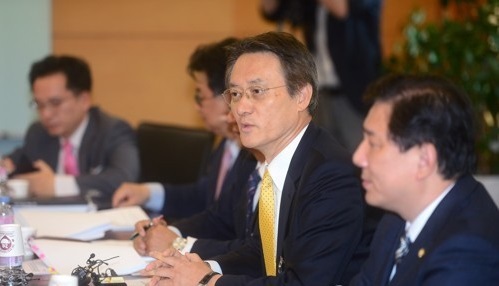The defense ministry will install a special reform panel to deliver on President Moon Jae-in's campaign pledges to bolster military capabilities, shorten military service for draftees and enhance their welfare, Moon's policy advisory panel said Thursday.
The ministry will also finalize its defense reform plan over the next year, the State Affairs Planning Advisory Committee said, citing its policy briefing.
"The issues that will be dealt with by this (reform panel) will include the size of military manpower, draftees' service term and plans for the operation of our troops," Park Kwang-on, the committee's spokesman, told reporters.

The reform panel will also explore ways to restructure the military's top commanding structure, enhance the arms acquisition process, upgrade key weapons systems and boost the morale of the country's 625,000 troops.
"All these (reform) tasks are related to the budgetary issues," Park said, noting that the new government will seek to jack up defense spending.
Moon has called for a phased increase of the country's defense budgets to around 3 percent of the gross domestic product, tallied at US$1.47 trillion, from 2.4 percent now.
The spokesman also said that the defense reform will be carried out in a way that will ensure the "balanced" development of the Army, Navy and Air Force and promote seamless cooperation among all armed services.
The defense briefing was part of a series of policy presentations to the advisory committee formed to make up for the lack of a transition period for Moon. The new president was sworn in earlier this month without any preparatory time due to the March 10 ouster of his predecessor, Park Geun-hye.
A major issue at the defense briefing was whether the installation of a Terminal High Altitude Area Defense battery on the peninsula requires parliamentary approval although its key elements have already been delivered to the site.
On his campaign trail, Moon repeatedly said that the THAAD deployment requires parliamentary ratification, noting that the former government failed to build public consensus on the crucial security decision.
Those supportive of Moon's position have mentioned a constitutional clause stipulating that the legislature has the right to consent to any treaty involving an "important financial obligation." Seoul has provided land worth around 89 billion won ($79.6 million) to host the US battery.
However, the defense ministry has insisted that the deployment was not a matter for parliamentary consent as it is covered under the South Korea-US mutual defense treaty already approved by the National Assembly.
At the briefing, the issues of retaking wartime operational control from Washington were also expected to be discussed.
During the election campaign, Moon pledged to push for the transfer of wartime operational control within his five-year term that ends in 2022.
In 2014, Seoul and Washington agreed to a "conditions-based" OPCON transfer in light of evolving North Korean threats, delaying the transition previously scheduled for December 2015. They did not set a specific date for the transfer, but observers presume it may come in the mid-2020s.
Lee Su-hoon, the chief of the committee's subpanel on security, stressed that the nation has to be able to provide for its own defense -- an apparent allusion to the need for the OPCON transition.
"We should strengthen our capabilities to respond to the North's nuclear and missile threats, and push for the OPCON transfer while ensuring a firm South Korea-US alliance," Lee said during his opening remarks.
"It is time to ensure security not just in our words ... but real security capabilities that can ably safeguard the lives of our citizens and their properties ... The Moon government will, for sure, ensure security."
He also stressed the need to stamp out deep-rooted corruption in the defense industry and enhance the welfare and human rights conditions for military draftees. (Yonhap)







![[KH Explains] Hyundai's full hybrid edge to pay off amid slow transition to pure EVs](http://res.heraldm.com/phpwas/restmb_idxmake.php?idx=644&simg=/content/image/2024/04/18/20240418050645_0.jpg&u=20240419100350)






![[From the Scene] Monks, Buddhists hail return of remains of Buddhas](http://res.heraldm.com/phpwas/restmb_idxmake.php?idx=652&simg=/content/image/2024/04/19/20240419050617_0.jpg&u=20240419175937)

![[KH Explains] Hyundai's full hybrid edge to pay off amid slow transition to pure EVs](http://res.heraldm.com/phpwas/restmb_idxmake.php?idx=652&simg=/content/image/2024/04/18/20240418050645_0.jpg&u=20240419100350)

![[Today’s K-pop] Illit drops debut single remix](http://res.heraldm.com/phpwas/restmb_idxmake.php?idx=642&simg=/content/image/2024/04/19/20240419050612_0.jpg&u=)